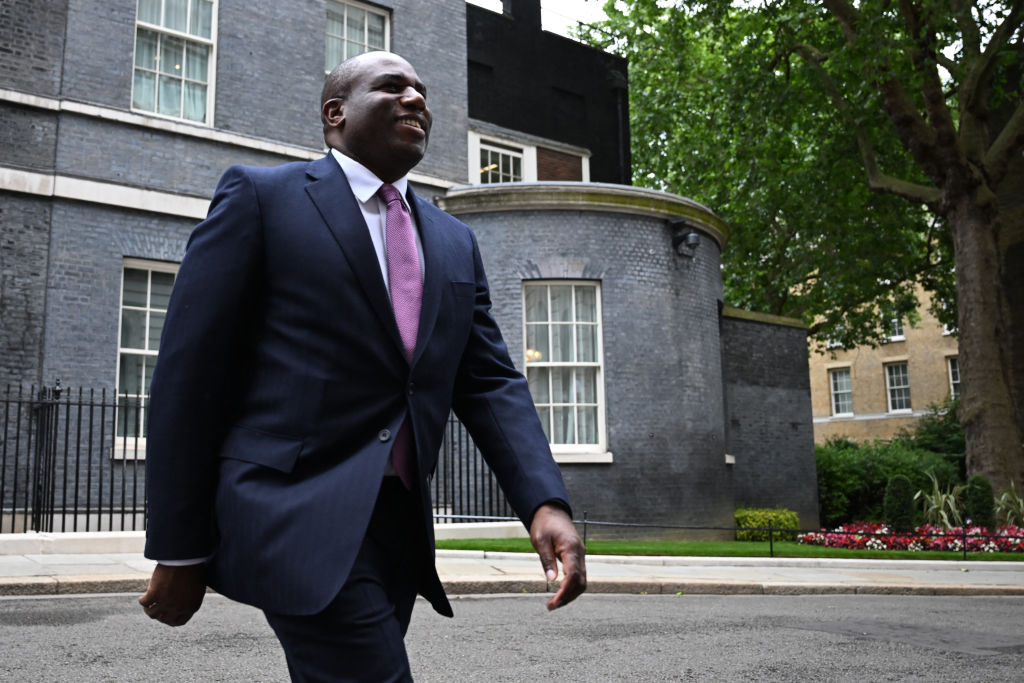Next summer, David Lammy will celebrate 25 years as a Member of Parliament. At 51, he has just been appointed Foreign Secretary after three years shadowing the role. Despite rare and valuable ministerial experience, he is an unlikely candidate for Britain’s chief diplomat.
His first pronouncements as foreign secretary stress change: ‘a reset on Europe, a reset on our relationships with the global south, and a reset on climate’. We will have not only resets but ‘gear shifts’, whatever that might mean: ‘gear shifts on European security and on global security, given all the problems that we’re seeing in the Middle East’. It is very Starmerist to treat change as a destination rather than a journey.
His overriding priority, as he falls in line with the mantra of the new administration, is growth. ‘I want to centre our foreign policy on British growth.’ His levers in this area are limited: trade agreements are the preserve of Jonathan Reynolds at Business and Trade, while the new chancellor, Rachel Reeves, will hold the reins on ‘securonomics’. But he may feel that a box has been ticked by saying it.
Lammy has always been a politician driven by an outspoken sense of what he sees as right and wrong, a strange blend of progressive activism and a Christian faith from his time as a chorister at Peterborough Cathedral. He blamed the 2011 London riots partly on a lack of discipline in families which stemmed from parents no longer smacking their children, and earlier this year told an audience at the Hudson Institute in Washington DC that he was ‘a good Christian boy’ and a ‘small-c conservative’.
He comes to his new role with a track record of intemperate remarks that reflect a moralising view of the world, veering into the undiplomatic and the absurd. In 2013, he accused the BBC’s coverage of the papal election of ‘silly innuendo about the race of the next Pope’ when it talked about black and white smoke; in 2016, he claimed that ‘one million Indians died’ during the second world war fighting for ‘the European project’. Then there was his now-infamous Mastermind performance.
Lammy has not held back on personal criticism. In 2017, he described Marine Le Pen, then a candidate for the French presidency, as a ‘fascist’; he called President Donald Trump ‘a racist KKK and Nazi sympathiser’; in 2022, he hailed Emmanuel Macron’s second victory over Le Pen as ‘a victory for democracy and cooperation over nationalism and intolerance’. No doubt he felt the moral force of all of these statements keenly, but the internet never forgets.
In May I suggested that Lammy’s remarks about a potentially resurgent Trump were particularly hazardous. The new foreign secretary has spent much time and effort building bridges in Washington recently, and his supporters claim he has charmed the Republican candidate’s cercle. Perhaps. But we know that Donald Trump is not a man who easily forgets a grievance, and already the US media is discovering Lammy’s oratorical history.
In terms of policy, Lammy was not idle as shadow foreign secretary: he wrote an earnest pamphlet for the Fabian Society in May 2023 entitled ‘Britain Reconnected’, and recently in Foreign Affairs he penned an essay called ‘The case for progressive realism’.
He seems to think he can accomplish a great deal simply by not being his predecessors
‘Progressive realism’ is either an apparent paradox cleverly resolved or an indulgent example of what Boris Johnson called ‘cakeism’. I suspect it to be the latter. Lammy claimed that ‘European security will be the Labour party’s foreign policy priority’ and wants to see a wide-ranging ‘security pact’ between the UK and the European Union. That represents one of his resets-cum-gear shifts, though achieving it without diminishing our commitment to Nato will not be easy.
In addition, the Foreign Secretary has written of wanting to ‘revitalise the faltering international system’, and of reforming the United Nations, the World Bank and the International Monetary Fund. The World Bank should focus more on helping developing countries create clean energy infrastructure, while the IMF should be a counterweight to Chinese influence and encourage alignment with Western values in education, healthcare and governance. This would be in line with his desired reset on climate and the global south.
What concrete actions will give effect to these? He seems to think he can accomplish a great deal simply by not being his predecessors, but as foreign secretary he must deal with the global community, which will not be cornering an anxious fatted calf at the mere arrival of a Labour government. Having painted the United Kingdom as toothless, isolated and irrelevant for years, Lammy must now arrest that apparent trend, and reverse it.
What does he bring to next week’s Nato summit in Washington and the subsequent meeting of the European Political Community at Blenheim Palace, other than eagerness? There will be no return to the EU, even to the single market or the customs union: Starmer has said Britain will not be a ‘rule-taker’. Defence spending will rise to 2.5 per cent of GDP but only “‘as soon as we can’ (the Tories had said 2030). Support to Ukraine will be maintained (Starmer and Zelensky have already spoken). There will be an ‘audit’ of our relationship with China, and recognition of a Palestinian state but without a time commitment.
David Lammy is beset by a careless intellectual conflation shared by several colleagues. He is incapable of distinguishing between process and outcome. Resetting relationships, shifting gears, auditing policy, holding reviews: all of these are mechanisms to achieve policy goals. What are the goals? 2021’s Integrated Review was imperfect but it expressed objectives: establishing a global lead in science and technology, developing domestic resilience, using international institutions to underpin free trade and openness.
Labour’s share of the vote only increased by 1.7 per cent but it carries a heavy burden of expectation. The electorate has been encouraged to expect change for the better, and scepticism has been waved away. David Lammy’s Foreign Office will find that the clock is ticking, whether he likes it or not.








Comments